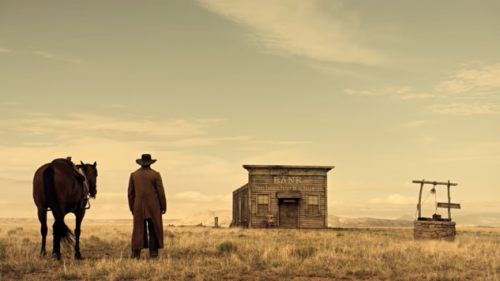THE DISASTER ARTIST And The Insanity Of Creativity
The Disaster Artist made me question everything I’ve ever done, and everything I might ever do.
To some, James Franco’s adaptation of Greg Sestero’s chronicle of the making of Tommy Wiseau’s The Room is a funny story about a kooky aspiring filmmaker making the worst movie of all time. To others, it might be a tale of interdependent or even parasitic friendship, or a wistful paean to the Hollywood dream. But to me, The Disaster Artist is all about the beautiful, nonsensical insanity of pursuing creative endeavours - and how you respond is likely dependent on how much the film resembles you.
As an adaptation of Sestero’s book, The Disaster Artist makes concessions to time and accessibility that, while necessary, rob it of some of the source material’s weight. Much of the film merely recounts events in Sestero and Wiseau’s story, without delving into the weird psychology of the book’s core relationship. The film’s final sequence - a side-by-side recreations of scenes from The Room - suggests the intended takeaway is simply how well Franco's actors imitate Wiseau's (i.e. with mechanical precision, but a little less genuine chaos). It’s a genuine miracle the movie isn’t openly insulting to its subject - it’s loving, even - but it doesn’t go into quite the depth that Sestero did.
Where The Disaster Artist really sings, however, is in its all-too-brief foray into dramatising the bizarre atmosphere on The Room’s set. I did not work on The Room*, so I can’t speak specifically to the struggles of the cast and crew who did. But The Disaster Artist’s on-set scenes uncannily capture the acute insanity of working under a charismatic asshole - an experience to which nearly any creative can surely relate.
Intense creative personalities - like Wiseau, and like many people with whom I’ve worked - have a unique ability to convince you that strange or even cruel behaviour is tolerable or even necessary to get the work done. This kind of pattern is everywhere in movies: see the countless stories about James Cameron, the events in Netflix’s Jim And Andy, or any number of directors who get away with on-set cruelty in the pursuit of a vision. I’ve seen it in theatre, too. These people put their teams through the wringer, sometimes in service of questionable projects, yet through sheer strength of personality, keep people on side even as they torture them. It's not really excusable, yet it so frequently gets excused.
The Disaster Artist seems undecided on whether Tommy Wiseau is that kind of guy or not. He definitely has a vision he believes in a thousand percent - The Room is very much a personal screed for him - but Franco's film doesn't paint him as either fully sympathetic or tyrannical. Sure, he hires and fires people willy-nilly; yells at cast and crew alike; and in the film's most uncomfortable scene, engages in borderline bullying of cast member Juliette Danielle - but he's just a guy with a dream, you know? A dream he somehow manages to convince (or straight-up pay) a whole cast and crew to help him achieve.
Creative egomaniacs don’t emerge from a vacuum, though. They need willing subjects, and in the performing arts industry, such subjects are in plentiful supply. This is an industry in which too many people cheerfully accept pay rates and working conditions far lower than they deserve, solely because they're doing what they love. Employers know that, too: the unspoken knowledge that there will always be someone willing to work for less hovers over every contract negotiation. Thus, every job is celebrated, no matter how unbearable. After all: as The Disaster Artist's Carolyn Minnott character (Jacki Weaver) says: the worst day on set is better than the best day anywhere else.
But is it? Where is the line across which it's not worth it anymore? Why do we tolerate shitty work under shitty people, subjecting ourselves to this weird creative Stockholm Syndrome time after time? The Room is a fascinating case study, because were it not for the cult following it's generated (which is incredibly rare; most of the hundreds of inept pictures made each year are merely forgotten), it'd be hard to even defend the experience on a creative level. If the experience is shit, the product is shit, and the career benefits are shit, what's the point? The Room is surely one of the more extreme tests of one's resolve in this regard. The Disaster Artist comes down squarely on the side of “worth it,” despite few of The Room's alumni seeing benefits from their experience beyond notoriety.
The Disaster Artist spends its entire runtime talking about dreams: Sestero’s dream of becoming the next James Dean, Wiseau’s dream of becoming the next Tennessee Williams, even Danielle’s dream of simply being in a “real movie.” Its climax - compressing the birth of the film’s beloved cult status into a single premiere screening - ties up that narrative thread cleanly and triumphantly, but in real life, it’s not that simple. Not unless you believe that becoming an ironic cult sensation is the fulfilment of a dream.
The life of a grunt-level creative professional - i.e. most of them - is one of wild ups and downs, of feast and famine, of being constantly at the mercy of your next gig. It's a life full of failure and rejection. Behind every struggling creative person’s confident facade lurks the primal terror that maybe the reason you haven’t made it isn’t because you just haven’t caught a break yet - maybe it’s because you’re just not good enough. Tommy Wiseau is a man who either never registered failure as a possibility, or found the wherewithal inside him to muscle through it, or maybe accepted that his specific failure is also his ticket to stardom. The Disaster Artist gets that. It also gets that despite all the hardship that comes with creative work, we keep going, even when it makes absolutely no sense.
Where it falls down is in its romanticism, its steadfast belief that the struggling outsider's life is something to strive for. As one of the many people like Sestero who’s moved cities (countries!) to pursue my own lofty career ambitions, hitting professional roadblocks along the way like everyone else, I came away from The Disaster Artist with a small raincloud hanging over my head. Coming from a director who’s achieved success beyond what anyone in The Room could ever hope for (Franco was born the same year as Sestero, and was working on Spider-Man, having just won a Golden Globe, while Sestero was shooting The Room), it’s hard to buy into its celebration of the creative struggle.
Perhaps one’s enjoyment of The Disaster Artist depends on where you stand on (or off) the ladder of achievement. How realistic is its aspirational story? That's going to be change with the degree of experience you have being someone like Greg, or dealing with someone like Tommy. Inspiration, defeat, or entertainment: The Disaster Artist does at least have something for everyone.
* Full disclosure: I have worked with The Room's Juliette Danielle, a wonderful person whose acting aspirations were put to rest for some time following the film's release. Here, I'm speaking only for myself.



